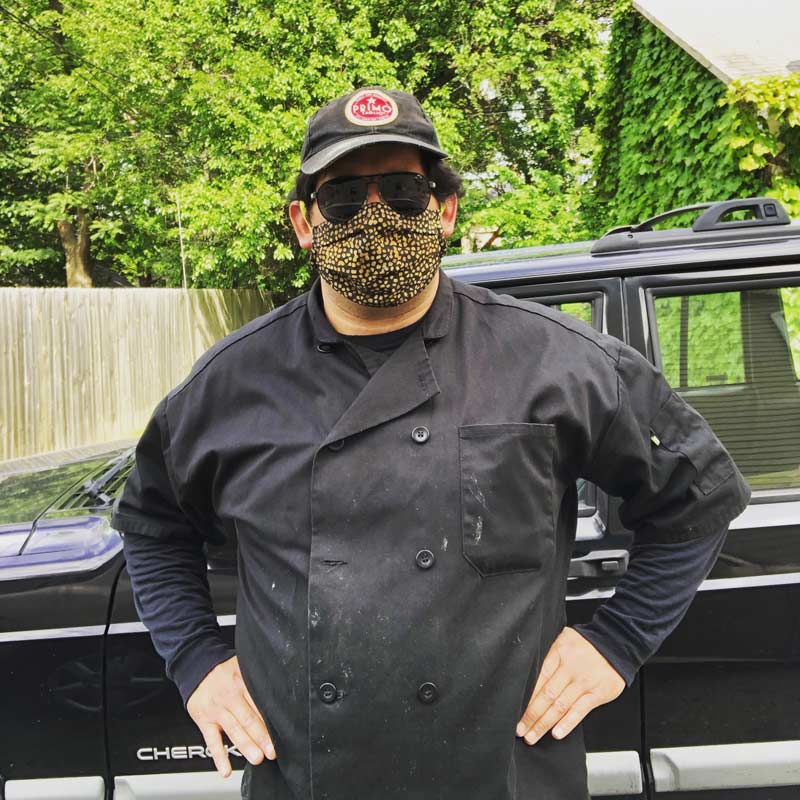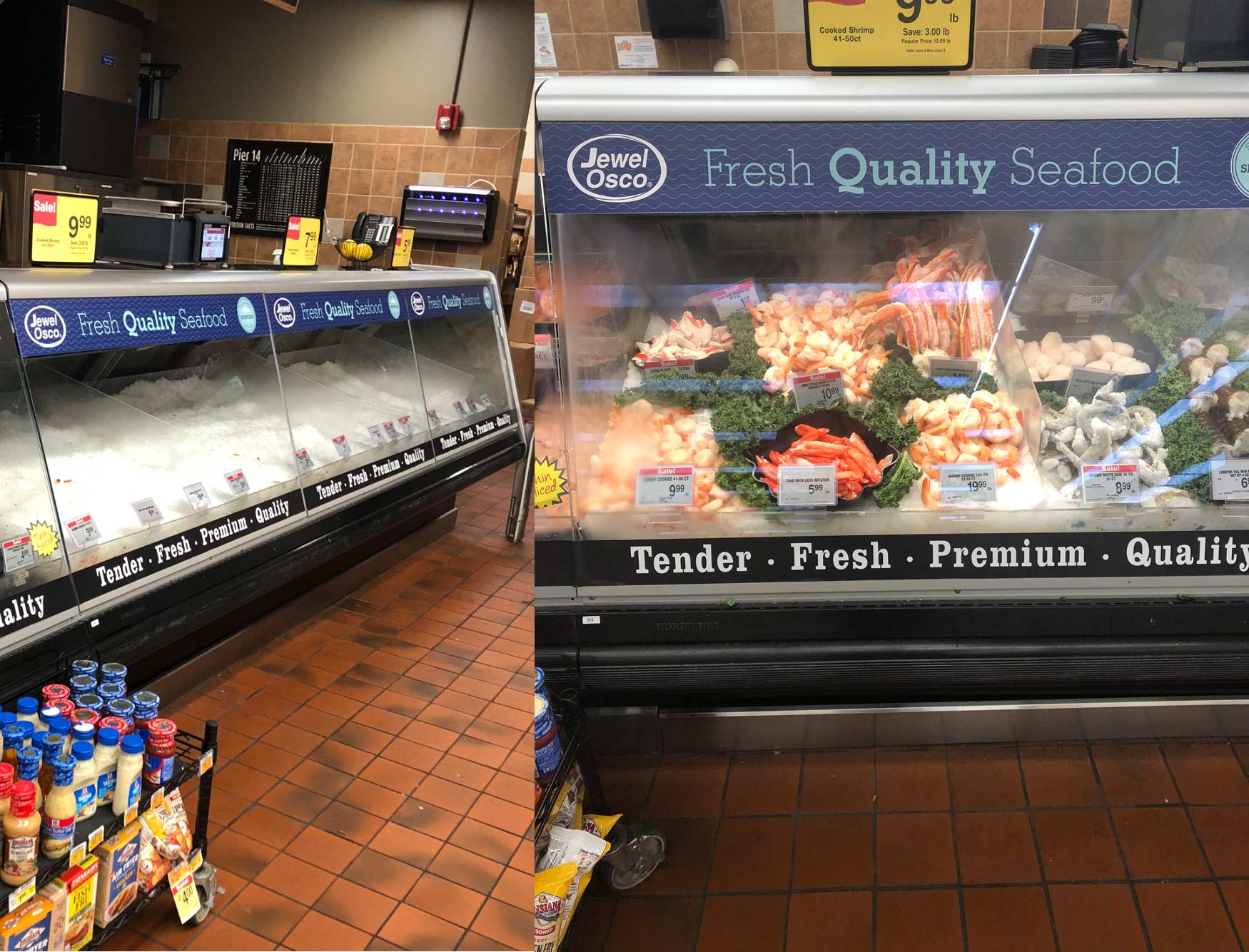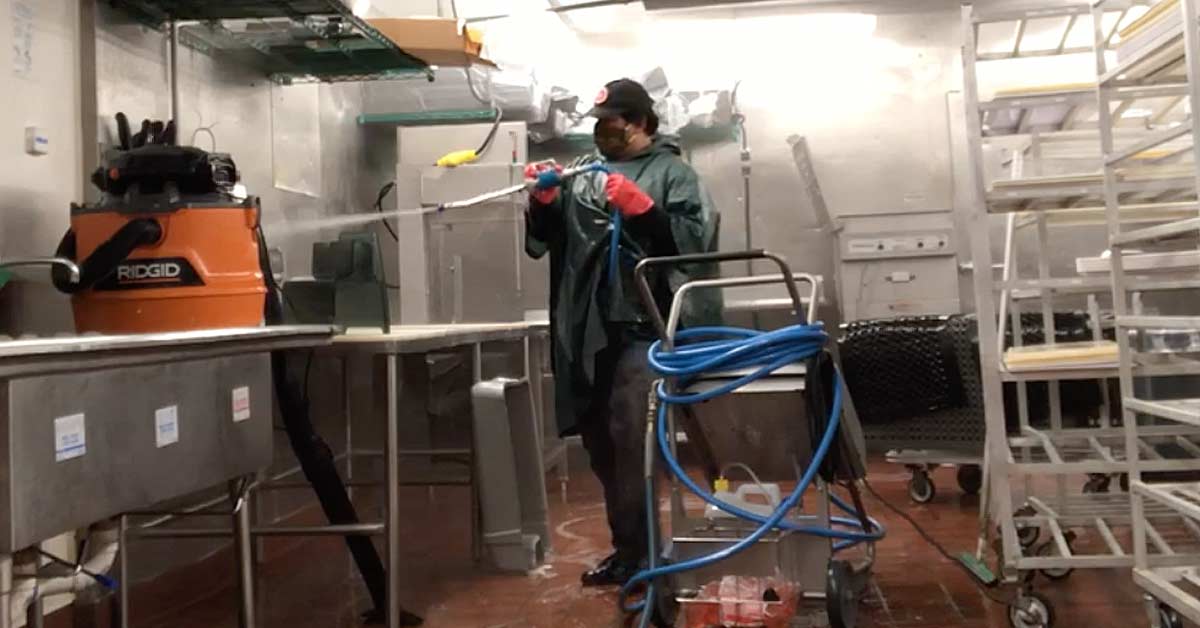One day I served some fish to an older man. He asked me: “Are you grieving?” Or at least I thought he did. Grieving for what? I wondered. My perplexed looked spurred him to repeat his question, and he slowed his cadence to let the words be understood even with his accent and the muffling of his mask: “How’s your breathing?”
I guess my mask was a dead giveaway. He then asked, “How much longer?” and I replied, “I’ll have your order right up, sir!” “No! No! How much longer like this?” he said, meaning the social distancing rules, the pandemic, the quarantine. I optimistically replied, “I’m hoping our governor gives us some leeway come June.”
“Are you praying for it?” he asked.
“Sir,” I answered. “I don’t pray. I prepare.”
I didn’t intend to belittle him, nor do I have anything against praying in general. My statement was a verbal confirmation of how I am currently dealing with the world around me. During situations like this, I think it best to reflect on how good we still have it. As someone who has been fortunate enough to make a living in the fitness and training industry for nearly 20 years, I’d say I (and we all) have it pretty good.
Why We All Should
The story above is an account of an interaction I had with a customer in my new job in the meat market of a local grocery store. You may ask why would I be working at a grocery store during a pandemic? Because I can! In fact, most of us in this industry can! We are all able-bodied, supposedly service-driven, and currently have the time.
It has almost become cliché these days to hear many of us in this industry speak or write about “serving others” or “impacting the community.” What better way to act than to help a local “essential” business provide for the community? Is it hard work? Yes! Do you get paid comparably? Not even close! But do you get the opportunity to serve the community and keep them safe? Absolutely!
Initially, the quarantine downtime was much needed and not all bad. But for me, the routine of waking up and preparing for nothing got old quickly. Share on XInitially, the quarantine downtime was much needed and not all bad. Taking some time to step back and regroup was probably a great thing for all of us. But for me, the routine of waking up and preparing for nothing got old quickly. Leave it to watching a few old-school Dusty Rhodes promos to get me going:
Times like these will reveal who we really are. Are we the ones who pray for better times…wishing that things get better? Or are we the ones that prepare to make things better? Are we the ones to go out there and do what we can, given the hand we are dealt? THIS IS A GREAT TIME to find out who we really are! Find out what we are made of! Find out what we are capable of!

For those of us who approach our daily sessions as providing “the best part of our client’s day,” the approach is the same but in a fraction of the time. Let’s face it, our service in private sector is a luxury for most people who can afford us. The service provided by grocery store clerks, staff, and management, on the other hand, is an everyday necessity for most (exacerbated by the current situation).
This meat market job required getting back to basics both physically and mentally. It specifically called for lifting and transporting heavy boxes of meat, handling heavy-duty cleaning equipment, and moving and positioning non-ergonomic landscapes.
For example, the counter is meant for customer presentation without regard for the comfort of the worker. Those big, plexiglass-covered cases look great from the front, but our access to safely get your order is not always easy. A small sliding glass door that sometimes gets stuck from semi-frozen meat juices serves as the only way in to access misaligned display trays. Getting the tray out was sometimes an effort in grace and balance, and you didn’t want to spill any chicken juices on the pork or beef…yikes! Flashbacks of working in tightly packed rooms, weaving in and out of forests of racks and bodies, came to mind—avoiding hazards while not infringing on personal space.
After my first few weeks of on-the-job-training, I was put in charge of “the pier.” Depending on my shift, this entailed setting (opening shift) or breaking (closing shift) the day’s catch with a combined focus on presentation, safety, and shelf-life preservation. I cannot understate the attention to detail needed for setting and breaking, as well as its tediousness. The cooked, raw, and live products needed to be assessed for freshness and separated. Avoiding cross-contamination while maintaining freshness were the key goals.

Comparably, the skill sets of area setup and incoming athlete assessment will become equally tedious and focused tasks moving forward. As we return to our work settings, preparing workspaces for safety (and the clear perception of it) will be paramount. Properly spacing small groups, applying surface barriers, and checking temperatures will now be our new normal.
Dealing with the pier, on top of the monumental efforts of cleanliness and dealing with shortages of both product and overall customer confidence, added to the pressure of the job. Even during pre-COVID times, customer interaction is the key to driving sales. Add the mental stress, emotional pendulum, and panic of a pandemic, and you have an exercise in futility on some days.
To start, market clerks must undergo double the safety training of any other employee in the store. What I thought were just regular sanitary procedures were amplified: constant handwashing, cleaning of surfaces, and avoiding cross-contamination became a lesson in obsessive-compulsive behaviors. Checking fridge/freezer temps, the stock of items, and when the fresh load was coming kept my senses on high alert during my entire shift.
Our initiatives to keep our athletes safe need to be visible to set their minds at ease as well as reflect our level of care for them. Share on XThis was especially important for customers to witness: The heightened level of care became habits in good “selling.” Setting minds at ease and maintaining customer confidence became an art form, as our everyday behaviors became our path to increasing store sales. Likewise, some of our clients may not want to return to our facilities immediately. As every sound business uses word of mouth to drive their sales, our initiatives to keep our athletes safe need to be visible to set their minds at ease as well as reflect our level of care for them.
Closing Is Crucial
Closing is the job that no one wants, but it was the most crucial to our success. It was clear to me how loathed this duty was when the two other guys that started at the same time I did in mid-April—both of whom had similar shift times—only lasted a combined total of two days. My first night closing was a lesson in humility and what hard work truly is. Breaking down the grinder, saw, and tenderizer correctly—followed by the most thorough cleaning process I have ever experienced—left my body sore, my clothes stinking, and the taste of sanitizer in my nostrils every single night.
As much as we all hate late-night gym checks, we need to take the time to leave our facilities as if we are opening on Day 1—not only to give us pride in our ownership, but also to tell our clients everything they need to know about our programs.
Closing the back room was made much easier due to a younger co-worker, Rich, who trained me. I cannot say enough about him: This young man displayed more patience than he should have and allowed me to learn by screwing a few things up. He did what every good coach does in that regard and taught me the road to perfection is littered with failure. For myself (as a coach), I found value in taking a step back and being less vocal, which allowed for more concise instruction in the spaces of time in-between. I must thank Rich for showing me what that looks like.
The first couple of times I closed, I had to do it on my own since the woman who was supposed to operate the front never showed up (and quit a few days later). Closing is a two-person job, where one cleans the back room and the other tends to customers and keeps up with other general duties. In this case, I was doing two jobs at once, and the effectiveness of each was marred by my attendance to the other.
You know the old saying about chasing two rabbits? If any of us have had staff no-show at our facilities, we know the havoc it wreaks on our plans. Well, in this case, just take a deep breath and do the best you can, even if it breaks you a couple of times. Those nights were rough, but as I gained experience, I mentally planned to do this job alone and developed a routine that made things easier.
Much like any new job environment, the learning curve depends on your level of attention and desire to do the job better and better. This is also imperative for all of you younger coaches breaking in: Develop your routines and contingency plans immediately! At the very least, it will keep you aware and ready for the worst.
Lessons and Customer Stories
The kicker with cleaning the back room in this store was that it did not have a central drain, which made the finishing touch a royal pain in the butt. As the machines were sprayed down, leftover meat particles sluiced with standing water bogged the area.
Video 1. Coach Pete Arroyo in action during the backroom closing and sanitizing process.
We rigged a Shop-Vac to suck up all this standing water. Every time it backed up, I had to stop the rinse and allow it to empty into a sink compartment. Any of us who have worked in or near bigger cities know the frustrations that come with stop-and-go traffic—in this case, my flow (no pun intended) was interrupted several times, making a long job even longer and wetter. But, hey, I signed up for this after all.
The lesson here is that even when situations and settings are less than ideal, there is always a tool available to get the job done, no matter how “primitive.” Share on XThe lesson here is that even when situations and settings are less than ideal, there is always a tool available to get the job done, no matter how “primitive.” Most coaches have many high-tech tools at their disposal these days, but if that OFF button was ever hit, what would you do? What if that fancy software program decides not to cooperate or the Wi-Fi crashes? Do you still know how to use a notebook? This actually did happen to me the week upon returning to my training facility.
One day I had a gentleman (or so I thought) ask for a few pounds of shrimp, but it had to be the Argentinian shrimp. “Don’t give me that Chinese s**t!” he demanded. “You can’t trust nuttin’ from there!” I was caught a bit off-guard that his reason for requesting the Argentinian shrimp wasn’t due to flavor or a particular recipe, but instead reflected some of the hysteria of the pandemic. I gladly directed him to the bagged shrimp in aisle eight, and I told him it was what we have in the display anyway (it’s the dirty little secret of the fish counter).
He told me he would wait instead for a fresh load another day. Did I not just tell him this was what we had on display? I was slightly entertained because his line was in one of my favorite movies of all time, “The Wrestler,” when Randy “The Ram” Robinson was placing an order of his own with the big guy in the gym. I won’t elaborate what that means. In this job, you interact with all types, and dealing with the stupid in a classy way becomes a skill.
You may have experienced this in dealing with well-to-do parents or ignorant sport coaches giving you “advice” on what they want their athlete to do. The best secret you can tell them is that there are no secrets.
Another older gentleman ordered some salmon one day and then asked: “Is that salmon fresh?” Quickly remembering my prior interaction with the Argentinian shrimp-shopper, I saw it as high time to use another line from “The Wrestler.” “Fresh as monkey’s breath, brother!” I replied. At first, he looked perplexed, but my subsequent giggle set him at ease, and he chuckled slightly when he realized I was joking. We have to keep things fun in dark and uncertain times!
Another day, an older woman came to the block and said, “I want three pounds of beef, freezer-wrapped, and I want it now.” At that point, we just happened to be out of the ground beef she wanted, and the butchers had to grind it fresh. This wasn’t a good start—she sighed loudly in disappointment, and I then had to turn my attention to other customers.
What made it a bit rougher was the fact that I wasn’t yet coached on how to freezer-wrap—after doing what I thought was right, I asked a more experienced cutter, only to have him point at the brown paper and tell me, “Use that.” Okay, I took my time and wrapped to the best of my ability (which, looking back, was not particularly good). And—you guessed it—she used that time to loudly complain, “Hurry up! Don’t you know what you are doing?” All this with a decent line of customers behind her.
Thankfully, the manager popped up, stepped in, and wrapped it, but when I turned around to give the customer her order, she had disappeared. I tracked her down and gave her the package, only to have her slam it into her cart without any verbal response. A few minutes later, a front-end worker brought it back to the market counter and said the customer didn’t want it. Man, was I angry…and the lesson here is you cannot please everyone (nor be everything to everyone), no matter the lengths you go to. For some, it will never be enough, and those are usually the ones who point fingers when they fail.
Continuing to Serve
In retrospect, taking a part-time job in the meat market at a local grocery chain was my way of preparing as opposed to praying. As anyone in our line of work can attest to, this pandemic situation has been rough on many fronts. Many of us in this field have businesses or jobs at schools and need our income to support our families. The financial, mental, and physical toll of having our livelihoods stripped away without foresight of “if” or “when” we could return goes without saying.
The anxiety from the idle time can wreak havoc on our bodies, minds, and souls. The best remedy for me was to continue to serve the best way I possible could. Share on XI am lucky: I do not have anyone I am solely responsible for. The only responsibility I have in that regard is taking care of those in the world around me (clients) and my reputation. The anxiety from the idle time can wreak havoc on our bodies, minds, and souls. For myself, the best remedy was continuing to serve the best way I possibly could. I’m certainly not a spring chicken anymore, but am able-bodied, have nothing but time, and love making an impact anywhere I can.
“Isolation is not desperation.” –Unknown





